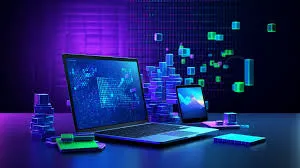
Computers have come a long way since their inception, revolutionizing virtually every aspect of human life. From communication to healthcare, education to entertainment, computers have significantly altered how we live, work, and interact with the world. In this article, we’ll explore the history, development, and profound impact of computers on modern society.
The History of Computers
The history of computers dates back to ancient times, with early computing devices such as the abacus. However, the concept of a modern computer began to take shape in the 19th century. Charles Babbage, an English mathematician, is often referred to as the “father of the computer” for his design of the Analytical Engine, which was a mechanical device capable of performing mathematical calculations. While Babbage’s design was never fully built in his lifetime, it laid the groundwork for future computing developments.
In the 20th century, key advancements such as the development of the vacuum tube and the invention of the transistor paved the way for the creation of the first true computers. The first general-purpose electronic computer, ENIAC (Electronic Numerical Integrator and Computer), was introduced in 1945. It was enormous in size and limited in capability, but it demonstrated the potential for automated computation.
In the following decades, computers became smaller, faster, and more affordable. The invention of the microprocessor in the 1970s, combined with the rise of personal computing, led to the creation of personal computers (PCs) and laptops that were accessible to individuals and businesses alike. The development of graphical user interfaces (GUIs) and the internet further transformed computers into indispensable tools for modern life.
The Components of a Computer
At their core, computers are composed of both hardware and software.
- Hardware refers to the physical components of a computer system, including the central processing unit (CPU), memory (RAM), storage devices (hard drives, solid-state drives), and input/output devices (keyboard, mouse, monitor, printer). The CPU is often referred to as the “brain” of the computer, as it performs the calculations and instructions that allow the system to function.
- Software consists of the programs and operating systems that tell the hardware what to do. The operating system (OS), such as Windows, macOS, or Linux, serves as the interface between the hardware and user applications. Software applications, such as word processors, web browsers, and graphic design programs, allow users to perform specific tasks and functions.
The Role of Computers in Modern Society
1. Communication
Computers have drastically changed the way we communicate. The internet, powered by computer networks, has made it possible for people to connect with others from virtually anywhere in the world. Email, instant messaging, video conferencing, and social media platforms have become essential tools for both personal and professional communication. Computers have also facilitated the rise of online collaboration tools that enable teams to work together seamlessly, even across different time zones.
2. Education
Computers have transformed education by providing access to a vast array of information and learning resources. Online courses, digital textbooks, and interactive learning platforms make education more accessible, especially for people in remote or underserved areas. Computers also allow students to conduct research, complete assignments, and engage with peers and instructors through virtual classrooms.
3. Healthcare
The healthcare sector has greatly benefited from the use of computers. Electronic health records (EHRs) allow doctors and hospitals to track patient histories, making it easier to diagnose and treat conditions. Medical imaging, such as MRIs and CT scans, relies on powerful computer systems to generate and analyze detailed images of the body. Furthermore, the rise of telemedicine, enabled by computer technology, has made healthcare more accessible to individuals in rural or isolated locations.
4. Business and Industry
Computers have become integral to virtually all business operations, from small startups to large multinational corporations. Accounting software, customer relationship management (CRM) systems, and enterprise resource planning (ERP) tools help businesses streamline operations and improve efficiency. Computers also play a critical role in automation, with industries using robotics and artificial intelligence (AI) to optimize manufacturing processes, manage inventories, and even predict market trends.
5. Entertainment
The entertainment industry has been transformed by computer technology. Video games, movies, music production, and graphic design all rely heavily on computer software and hardware. Computers have enabled new forms of entertainment, such as virtual reality (VR) and augmented reality (AR), that provide immersive experiences for users. Streaming services like Netflix, Spotify, and YouTube have reshaped how people consume media.
The Future of Computing
As technology continues to advance, the future of computing promises even more exciting developments. The rise of quantum computing holds the potential to solve complex problems at speeds far beyond the capabilities of current computers. Artificial intelligence and machine learning are expected to continue their rapid evolution, creating new possibilities for automation, healthcare, and creative industries.
Additionally, the continued miniaturization of computer components, along with improvements in battery technology, will lead to even more portable and energy-efficient devices. The integration of computers into everyday objects through the Internet of Things (IoT) will create a more connected and intelligent world.
Conclusion
Computers have come to play a crucial role in shaping the modern world, touching virtually every aspect of our daily lives. Their development, from massive machines that filled entire rooms to the powerful, portable devices we carry in our pockets, is a testament to human ingenuity and innovation. As we move into the future, computers will continue to drive change, making new possibilities and breakthroughs in various fields. The journey of computing has only just begun, and it holds endless potential for further advancement and discovery.